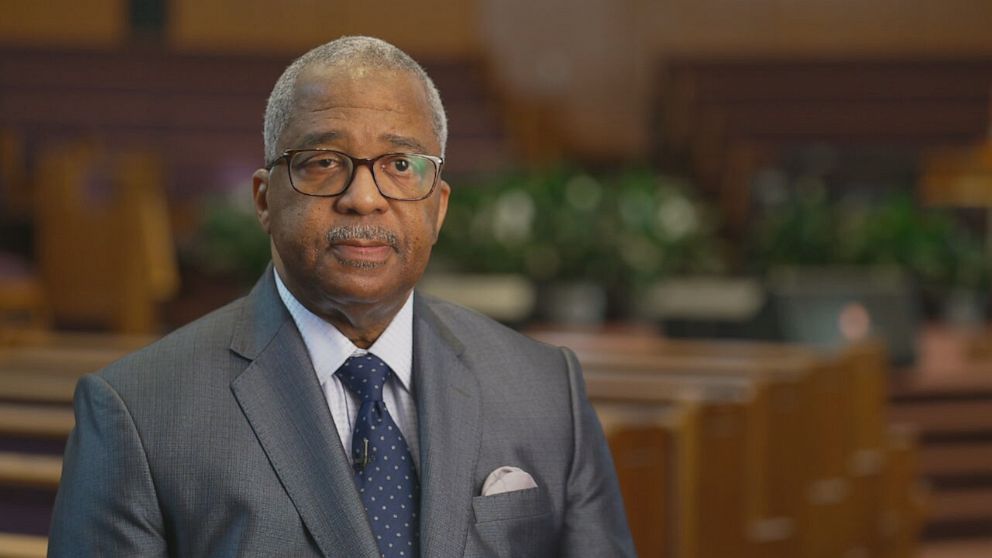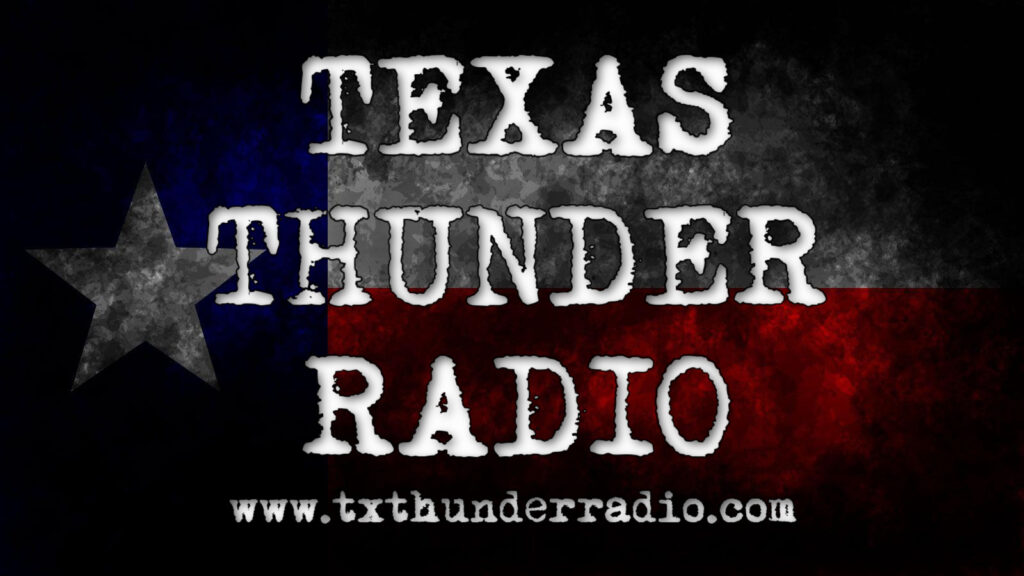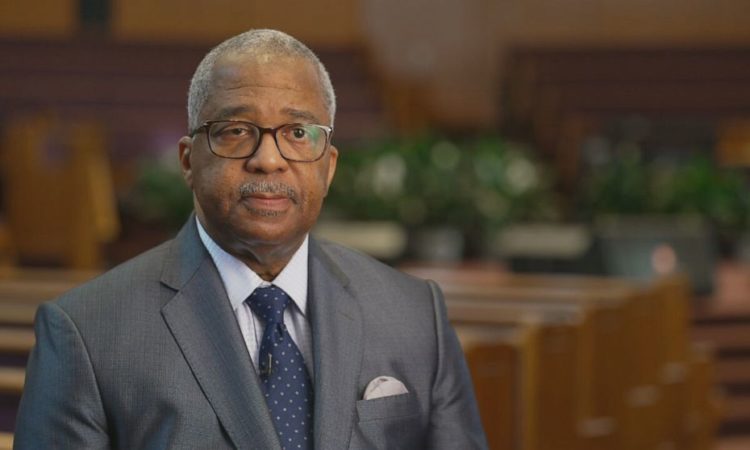 ABCBy ASHLEY LOUSZKO, ALLIE YANG, LAURA COBURN, JINSOL JUNG, and NEIL GIARDINO, ABC News
ABCBy ASHLEY LOUSZKO, ALLIE YANG, LAURA COBURN, JINSOL JUNG, and NEIL GIARDINO, ABC News
(PITTSBURGH, Penn.) — Since the start of the COVID-19 pandemic, Rev. Paul Abernathy has been helping his Pennsylvania community navigate the virus’ devastating impact.
Now, as the end feels within reach, Abernathy has been preaching beyond the walls of St. Moses the Black Orthodox Church in Pittsburgh. He’s also by going door to door throughout the city to say a prayer for guidance and spread the gospel of health.
Abernathy and his team at the Neighborhood Resilience Project are trying to convince residents in the predominantly Black and underserved Hill District to get vaccinated.
“We have to understand that if we are going to preach the gospel, it isn’t with words by which we preach it most loudly, but it is with action,” he said.
Watch the full story on “Nightline” TONIGHT at 12:35 a.m. ET on ABC.
COVID-19 is the latest trauma to rip through the neighborhood, which he says has long been plagued by poverty and gun violence.
“This pandemic has been a traumatic experience for the nation,” Abernathy said. “Having said that, it has been so much more traumatic for those communities that were already inundated with trauma.”
Perhaps those old wounds in part help explain why Abernathy says he has been met with a great deal of resistance as he tries to sign people up for a COVID-19 vaccine shot.
Multiple people told Abernathy’s team they’re not interested in getting the vaccine. One man joked with Abernathy, saying he feels like the shot is the Antichrist.
“Obviously, I’m wearing a collar, so I’m concerned about those things, too,” Abernathy told the man. “So, what I would say is, what is very important is that God is a God of life. This is very important and, sometimes, when we pray, he gives us blessing by way of medicine [and] by way of vaccines.”
Abernathy and his team were able to convince the man to give them his name and number so that he could be added to a waitlist for the vaccine.
As the vaccine rollout continues to expand, the Centers for Disease Control and Prevention reports that communities of color, including Black Americans, are getting vaccinated at disproportionately lower rates than white Americans.
Abernathy says he believes it’s because these communities have less access to the vaccine. For many, there’s also hesitance to trust the institutions that have created and encouraged it.
“Anecdotally, there are really three overarching cultural attitudes as to why people have been hesitant to receive the vaccine. The first would be a distrust of the government. There’s a history of government systems in our community that have failed or sometimes been overtly oppressive,” he said.
He continued, “The second would be a history of clinical abuse. … A lot of people reference Tuskegee … but Tuskegee has become a term that calls to mind all of the lived experience of clinical abuse that people have in not only their family history but also in their lived experience. And the third, [an] overarching cultural attitude that I’ve confronted would be a distrust of corporate America.”
For these reasons, Abernathy believes that faith leaders like himself should step in and help boost peoples’ confidence in the vaccine.
“Part of our church, part of our vocation, is to help lead our communities, even in the face of decisions that our communities are not comfortable with,” Abernathy said.
He says it’s important to validate the community’s legitimate concerns.
“We also want to say at the same time [that] although there have been historical challenges, historical injustices, this has to be a time where really we come forward and try to forge a new way forward,” Abernathy said.
He says helping people get vaccinated is work that moves him.
“It is all of the broken-hearted prayers that are uttered day and night in our community that moves me. There are people who are on their knees, they are crying out to the heavens… They do not believe in their heart of hearts that anyone here on Earth is listening to them,” he said.
It is a prayer uttered across the United States, from metropolises to the countryside.
In Tuskegee, Alabama, Lucinda Williams Dunn served as the city’s first female mayor from 2000 to 2004. It’s the same city where the infamous syphilis study took place.
From 1932 to 1972, the U.S. government recruited Black men to take part in a study, but did not tell them about the study’s true purpose: to observe the effects of untreated Syphilis. Those who had the disease did not receive proper treatment to be cured.
“You can understand how our folk have suffered a long time with the abuse of the medical field,” Dunn said. “It is not just about the public health syphilis experiment. It is about decades of distrust that was built. Every time you started trusting, someone would come along and change that whole phenomena. And there we are, you know, like ‘I’m just having a baby and you cannot give me the proper care because I’m a Black woman.’ Right now, Black women are suffering from an increase in deaths from childbirth.”
Dunn is now the founder and president of the Tuskegee Macon County Community Foundation and holds a Ph.D. in program development and administration. She says there’s an urgent need to understand how decades of institutional inequality have resulted in a mistrust of the COVID-19 vaccine in some communities of color. That’s one of the reasons why she herself is hesitant to get vaccinated.
“I’m not going to do it right now,” she said. “It’s not that I’m not ever going to take the vaccine, I just believe that we haven’t had enough time to successfully develop the vaccine that’s going to cure and/or prevent coronavirus.”
The vaccines were developed and authorized within a year, but the trial process for safety and efficacy did not skip any steps and the technology used to make them had already been in development for years.
Dunn does not believe her stance sends a mixed message to her community.
“Because I’m quite frank about it,” Dunn said. “I am truthful about how I feel about the vaccine and I don’t mind sharing that. But what I am not saying to people is that you got to follow me along that pathway.”
She also spoke about the role her identity and her community’s experiences influenced her decision.
“I have to put who I am, my community and my race, in the concept of racism. Racism is not dead,” Dunn said. “You fooled us before. Are you fooling us now? I mean, that’s a legitimate concern in our community, and it has nothing to do with the syphilis study. … It is about a whole lot of different things that have been passed down from [my] great-great grandmother all the way down to me.”
But distrust toward the health care system is only part of the story. A recent NPR analysis found that COVID-19 vaccine sites, particularly across the South, were largely missing from predominantly Black and Hispanic communities whereas fewer whiter neighborhoods were without one.
These sobering statistics, which point to a lack of access, are one of the reasons why some Black churches across the country have paired up with clinics to not just bridge the mistrust gap, but to expand vaccine accessibility.
Bishop John Borders runs Morning Star Baptist Church, located in a predominantly Black neighborhood on the south side of Boston. He has turned this house of worship into a house of healing, both spiritually and physically.
He hopes that as a result of this work, “those who desire to take the vaccine … will not have to walk far” to get it.
Borders’ church partnered with Boston Medical Center to offer COVID-19 vaccinations to community members. He says making the vaccine more accessible to people is key to achieving a buy-in.
“When you ask them to come out to Gillette Stadium or something like that to take a vaccine, you’re not going to receive much of a response,” he said. “But when they know they can leave their houses, go to their house of worship and find trained, skilled people working in collaboration with their spiritual and religious leaders, there’s a level of trust that they develop, and people are lining up to take the vaccine.”
Borders has been a pastor at the church for more than 40 years. In 1992, he had another community crisis on his hands when gang violence spilled into the sanctuary as rival gangs clashed during a funeral service. A young man was stabbed and several others were injured in the attack.
“In 1992, we were right in the midst of gang violence in Boston,” he remembered. “We saw 300 ministers from every walk of life and every major religion meet in our former funeral home at that time to discuss the gang problem. … Violence among gangs went down to zero [for] five to 10 years as a result of the work that we did here with local clergy.”
Now, he and his colleagues are coming together to face the latest crisis: the coronavirus. The city of Boston has seen more than 1,300 deaths.
“My heart breaks when I hear that members have passed away without a funeral,” Borders said. “When I would go to give the last rites to someone who’s passed on or about to pass on, and we’ve had to do it with a camera, that’s heartbreaking. I’m looking for a time when we could have funerals again and we can have weddings again, and that will not happen unless everyone takes the vaccine.”
The vaccine program, which launched in mid-February, has administered 5,300 first doses of vaccines so far across the city. He credits the program’s success to its partnership with Boston Medical Center and its doctors, like emergency medicine physician Dr. Thea James.
“At my hospital, the majority of our patients reside in communities that have been historically disinvested in,” James said. “I understand that they cannot prioritize health, and they’re using their resources to maintain some sort of stable housing and to buy food for their families and to pay for utilities. There’s nothing really left over to use for prioritizing health.”
She explained that addressing the root causes is essential to fixing systemic racism.
“These days, we’re talking about treating our patients by going upstream,” James said. “If you imagine walking along a stream and you see children floating down with broken arms, most well-meaning people will stand at the bottom of the stream, and pull them out, all day long, for decades, quite frankly. But until we’re able to go to the top of that stream and understand where that’s coming from, we will never have an opportunity to mitigate it, or even eliminate it.”
For community leaders like Borders, James, Dunn and Abernathy, this moment in our nation’s history is about so much more than getting shots in arms. It signals the first steps in what they hope will be a new foundation of trust, dignity and resources in these communities, long left anemic by generations-old inequality. Each leader hopes this pandemic will manifest a vaccine to cure old pains.
“It takes a lot to undo that narrative for ‘othering’ people,” James said. “So, it’s not extremely complex and complicated. But it requires intentionality to be able to address it and to disrupt it because, until that happens, we can’t expect that the data will ever change.”
Copyright © 2021, ABC Audio. All rights reserved.



Comments are closed.